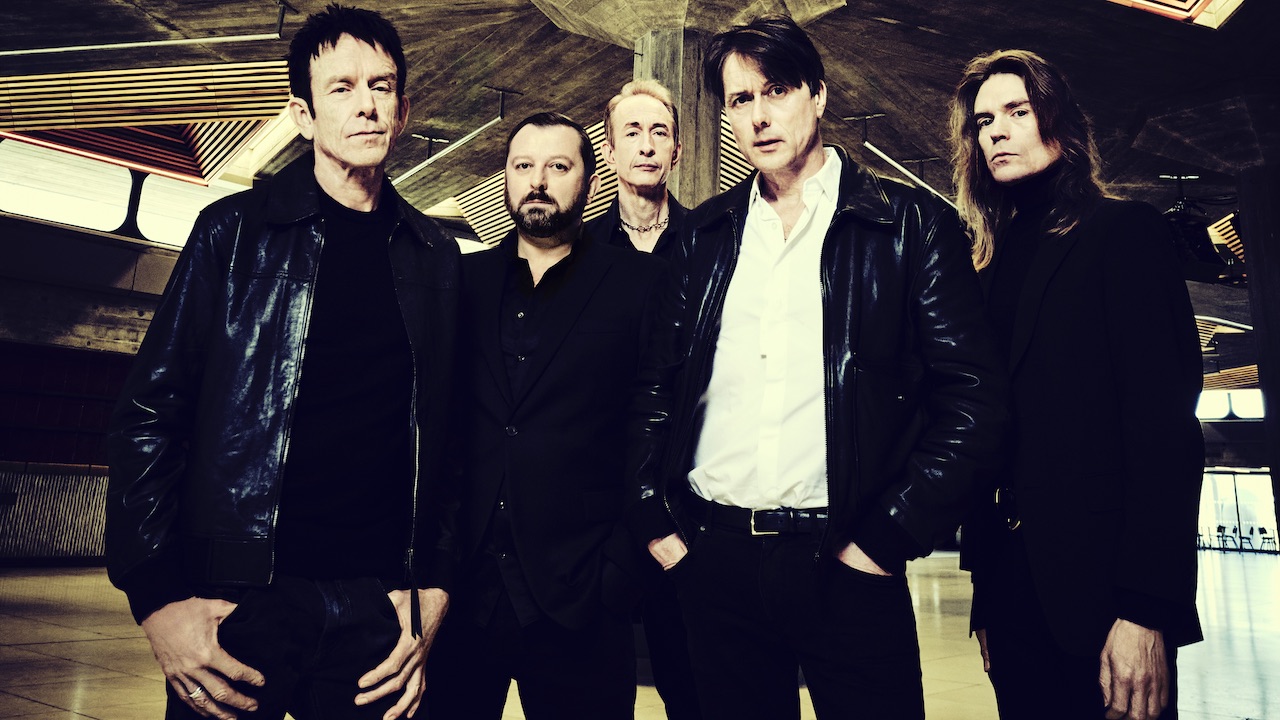"While so many of their peers have faded, disappeared or lapsed into pure nostalgia, Suede continue to make music that matters." Every Suede album ranked from best to worst
The highs and lows of the three decades-plus journey undertaken by the UK's most darkly seductive art-rockers over ten albums

Select the newsletters you’d like to receive. Then, add your email to sign up.
You are now subscribed
Your newsletter sign-up was successful
Want to add more newsletters?

Every Friday
Louder
Louder’s weekly newsletter is jam-packed with the team’s personal highlights from the last seven days, including features, breaking news, reviews and tons of juicy exclusives from the world of alternative music.

Every Friday
Classic Rock
The Classic Rock newsletter is an essential read for the discerning rock fan. Every week we bring you the news, reviews and the very best features and interviews from our extensive archive. Written by rock fans for rock fans.

Every Friday
Metal Hammer
For the last four decades Metal Hammer has been the world’s greatest metal magazine. Created by metalheads for metalheads, ‘Hammer takes you behind the scenes, closer to the action, and nearer to the bands that you love the most.

Every Friday
Prog
The Prog newsletter brings you the very best of Prog Magazine and our website, every Friday. We'll deliver you the very latest news from the Prog universe, informative features and archive material from Prog’s impressive vault.
Often hailed for their pivotal role in laying the groundwork for the Britpop era, Suede were o much more than a mere warm-up act for Blur, Oasis, Pulp and a generation of English guitar bands who followed in their slipstream.
Swaggering into a moribund British 'alternative' scene then cowed firmly in the shadow of US grunge, Suede looked, talked and sounded like an important, game-changing band from the moment their striking debut single, The Drowners, dropped in May 1992. The following year, with a self-titled debut album which frontman Brett Anderson grandly declared to be about "sex and depression in equal measure", they drew upon classic British glam (specifically David Bowie), indie (chiefly The Smiths), and post-punk to make the most arresting British rock album since The Stone Roses, with Anderson's whimsical androgyny colliding with Bernard Butler's fiery guitar heroics.
The UK's 'inkie' music papers quickly declared Suede 'The Best New Band In Britain'. More than three decades on, fans would argue that the quintet are simply Britain's Best Band. For while so many of their '90s peers have faded, disappeared or lapsed into pure nostalgia, Suede have survived, and indeed thrived, continuing to make music that matters, as emphatically proved by their most recent album, Antidepressants.

10. Head Music (1999)
Released three years after the euphoric, triumphant Coming Up, an appropriate alternate title for Head Music might be 'The Comedown'. With Brett Anderson's barely-concealed crack addiction putting the group's inter-personal relationships under considerable strain - guitarist Richard Oakes admits to showing up for rehearsals half-pissed in order to handle being in the same room as the singer - it's no wonder that the quintet's fourth album lacks cohesion and focus.
That said, given the climate in which it was cobbled together, Head Music has no right to sound as good as it does. Produced by Steve Osborne, best known for his work with New Order, U2 and Happy Mondays, Suede's trademark sound received a pre-Millennium update with the integration of elements of electronica and dance music, as heard on lead single Electricty and the title track. With his head not fully in the game at the time, Brett Anderson would subsequently lament not pushing what became his group's third number one record into even more experimental territories, but if this is Suede at their worst, Head Music is certainly no embarrassment.
Buy Head Music
9. A New Morning (2002)
The final Suede album released ahead of what proved to be a seven-year hiatus, A New Morning was recorded by a unit weakened by the 2001 departure, for health reasons, of longtime keyboardist Neil Codling. Fan expectations were further lowered by two mediocre singles, with Positivity possessing a soft, acoustic vibe, while Obsessions found Suede trying but sadly failing to reconnect with the dark glamour of their early work.
Lacking a clear direction, with drug abuse rife and discontent festering, A New Morning plays out as listless and uneven, and while its predecessors all debuted within the top 5 on the UK album chart, their fifth collection failed to breach the top 20. It's easy to see why a jaded and weary band splintered in the wake of its failings. When Suede returned, Brett Anderson described the album, with brutal honesty, as "a disaster in every way", concluding "It was just a very bad record."
8. The Blue Hour (2018)
Written and composed over 18 months, recorded in just six weeks, The Blue Hour, titled in reference to "the time of day when the light is fading and night is closing in" the band revealed, was steeped in a touch of duality from the start. A dark, bold piece of art, featuring a choir and poetic spoken word dialogue, like most of Suede's 'second act' records, it's a fine addition to their catalogue, albeit one perhaps missing that special 'something' that elevates their very best work.
The latest news, features and interviews direct to your inbox, from the global home of alternative music.
Where Suede's early work sought to evoke both the suffocating blandness of suburbia and the edgy, seedy thrills of after-dark London, The Blue Hour has a rural setting, and an uneasy gothic tone. Speaking to NME ahead of the album's release, Brett Anderson described its character as "quite dank and troubling", explaining, "A lot of this is about the terrors of childhood, so it’s quite unpleasant in lots of ways. I think Suede should be unpleasant, that’s the point of a band like Suede."
If the defining characteristic, then, of The Blue Hour is its lack of elegance when compared to Suede's early work, this actually works in its favour on an album which deliberate challenges lazy preconceptions about who/what Suede are in the present tense.
7. Night Thoughts (2016)
In contrast to The Blue Hour, Night Thoughts has elegance in spades, summoning ghosts of Suede's past, imbued as it with a similar sense of romanticism and glamour - and the same undercurrent for potential danger - which run through their acclaimed debut album and Dog Man Star.
It stands up as a tremendous latter-day album from a continuously curious band. Through its layers of guitars, keys, and distinctive vocals, Suede deliver spacious sonic textures for songs about love, anxiety, mortality, and future hopes, fears and expectations. The album was accompanied by an atmospheric film directed by former NME photographer Roger Sargent, but with lyrics and music alone the likes of When You Are Young, No Tomorrow, and Learning To Be paint their own vivid images.
Buy Night Thoughts
6. Bloodsports (2013)
Precious few bands return from hiatus with work of a standard to mirror their early accomplishments. So, in 2013, when Suede cemented their comeback with the promise of a sixth studio album, few would have imagined that they could do just that.
Arguing that Bloodsports is as spectacular or inventive as Suede's early records is a stretch. But it's within the same postcode. Meaning that with their return to the fray, Anderson's band effectively erased much of the sneering and snark heaped upon the band as it unraveled in the early 2000s. With Richard Oakes doing his best to evoke Bernard Butler's operatic six-string flurries and Anderson wailing like it's 1995, on tracks like Hit Me and It Starts And Ends With You, Suede managed to recapture touches of the divine melancholy which made them beloved in the first place.
Buy Bloodsports
5. Autofiction (2022)
During a pre-release press junket for Autofiction, Brett Anderson was quoted as saying, "Every record is a reaction to the last record to some extent. You don't want to just keep going in the same direction." These were not empty words.
Bristling with the anger and angst of a class of '82 punk album, Autofiction is Suede on fire. There's brushes of nostalgia to satiate the old faithfuls, but with enough forward-thinking musicality, electricity and relevance to draw in a generation of new believers. It's so good, in fact, that the likes of She Still Leads Me On, Personality Disorder, and Shadow Self make one forget there ever was a pre-Richard Oakes era.
4. Antidepressants (2025)
Introducing Suede’s tenth album ahead of its September 5, 2025 release, Brett Anderson said "If Autofiction was our punk record, Antidepressants is our post-punk record. It's about the tensions of modern life, the paranoia, the anxiety, the neurosis. We are all striving for connection in a disconnected world... This is broken music for broken people."
But what a life-affirming record. Antidepressants sounds like it was recorded in a day by a bunch of pissed-off art students sharing a hatred of authority and a mutual love of Joy Division, Killing Joke, Siouxsie and the Banshees, Echo & The Bunnymen and Gang of Four. A band this deep into their career have no right to sound this good, this urgent, or as fierce as Suede do here on the likes of Disintegrate and the title track. If Antidepressants was a debut album, it'd be garnering Suede 'Britain's Best New Band' plaudits anew.
3. Dog Man Star (1994)
Having made such a seismic impact with their acclaimed debut album, Suede were never going to dial back their ambitions or compromise their vision when tasked with delivering its follow-up. Rolling Stone duly labelled Dog Man Star "one of the most pretentious albums ever released by a major label", a diss one imagines a doubtless delighted Brett Anderson would have worn as a badge of honour. Your loss America.
That he and Bernard Butler, who wanted to produce the record himself and furiously resented being denied that opportunity, held absolutely nothing back when reunited in the studio with Suede producer Ed Bueller in early 1994 was surely informed by a growing awareness on the part both men that their friendship and creative partnership might not survive beyond the recording sessions. For these increasingly hollow men, come what may in the studio, the world would end with a bang, and not a whimper.
And so Dog Man Star was mapped out for a widescreen format, Suede granted the broadest of canvases across which to unfurl an epic story of the pursuit of dreams and ambition while managing broken hearts and broken homes, tragedy and trauma, desperation and death, all the big stuff
So, sure, at times it can be a bit hard to decipher, a bit overwhelming, a bit extra. But if you step back and soak in tracks like We Are the Pigs and The Wild Ones for what they are – pieces of distinctive art – the grandeur of the record comes into complete focus. For its chief architects, Dog Man Star was conceived as an anti-Britpop statement, a rejection of the simplistic sentients of Live Forever, and both Anderson and Butler would have been aware that this was an not album destined to dovetail neatly with the culture and climate of the time. And in following their muse, and (temporarily) setting aside their personal differences, they crafted what may be Suede's most idiosyncratic artistic statement.
By the time the album's provocative lead-off single, We Are The Pigs, was released is September '94, Butler had already walked away from Suede, never to return. Which meant that the band's appearance on Top Of The Pops to promote the single would become notable for being the world's introduction to 17-year-old Richard Oakes, Suede's new guitarist, who had played not one note on their forthcoming dark masterpiece.
2. Coming Up (1996)
The loss of gifted guitarist and musical lynchpin Bernard Butler could have easily derailed Suede: beyond the obvious loss of momentum his departure would inevitably trigger, the timing of his exit coincided with the UK music weeklies, BBC Radio 1 and influential international media organisations beginning to realise that Oasis' Noel Gallagher and Liam Gallagher, Blur's Damon Albarn and Pulp's Jarvis Cocker were every bit as quotable as Brett Anderson and arguably more relatable than Suede's frontman. A worst case scenario could have seen Suede shunted out of the spotlight at the exact point that Britpop began penetrating mainstream consciousness.
Instead, Suede dusted themselves down, located another prodigiously-talented guitarist in teenager Richard Oakes, and commenced more collaborative, less charged writing sessions for a third album in which each band member, including new addition Neil Codling on keyboards, could feel invested. The result was Coming Up, easily the most accessible, and arguably the best-known, album of their career. At the outset of the writing process, Anderson pitched the notion of Suede album three being a 'pop' album, featuring 10 potential hit singles. In the end, in a span of 12.5 months, it delivered no fewer than five Top 10 hits in the UK, and was classified as a 'platinum-selling' (300,000 UK sales) album within three months of its release.
But even as Coming Up penetrated the mainstream, Suede cleverly maintained an image as scene outliers, champions of the marginalised and misunderstood, so that Anderson's empathetic, underdog anthems - encapsulated in the the album's cornerstone lyric 'We're trash, you and me / We're the litter on the breeze' - rang out as sincere, honest and believable. And in that visual lyric, Anderson was able to astutely assure Suede's original fan-base that they'd still be fighting to amplify their voices, concerns, and fears long after Britpop fizzled out and faded from centre stage.
1. Suede (1993)
Was there ever really any doubt as to which Suede album would occupy the number one spot? Suede's self-titled debut was a game changer.
Preceded by three incredible single - The Drowners, Metal Mickey and the remarkably graphic Animal Nitrate ('Well he said he'd show you his bed / And the delights of the chemical smile So in your broken home he broke all your bones / Now you're taking it time after time') - it lives up to every word of the hype thrown its way ahead of it's March 29, 1993 release and properly introduced Anderson and Butler as a Morrissey/Marr-esque songwriting partnership for a new generation.
"Rarely has a record from the indie sector come with such a burning sense of its own significance," noted Q magazine, approvingly in its review of the record. Suede duly charted at number 1 in the UK, selling north of 100,000 copies in its first week on sale, and would go on to win the Mercury Music Prize. It remains a benchmark for great British rock in the modern era.
"It was a wonderful time for us when we were all still young men; wild – eyed and passionate and heedless, when we were still united and mutually purposeful and when it felt like the world could be ours," Anderson reflected as the album received a 25th anniversary reissue. "The album is charged with a naivety but it manages to have a feel which I still love; it rages and it screams, it yelps and it whispers and captures some truth of who we were at that moment in our lives: youthful, impertinent, ambitious and flawed."
Nailed it.
Andrew Daly is a contributing writer at Guitar World. In addition to currently working with Copper Magazine, Goldmine Magazine and Ultimate Guitar, Andrew is the founder and editor of VWMusic, a successful rock-oriented outlet launched in 2019. Andrew has interviewed the likes of Joe Perry, Stone Gossard, Paul Stanley, Joe Satriani, Steve Vai, Tommy Thayer, and many more. While his instrument of choice may be the drums, Andrew is a lover of all things guitar. Some of his favourite bands are Kiss, Oasis, Spread Eagle, and Starz.
You must confirm your public display name before commenting
Please logout and then login again, you will then be prompted to enter your display name.





![Suede - Trash (Top of the Pops, 26/07/1996) [TOTP HD] - YouTube](https://img.youtube.com/vi/cj5Xwc2wExw/maxresdefault.jpg)


